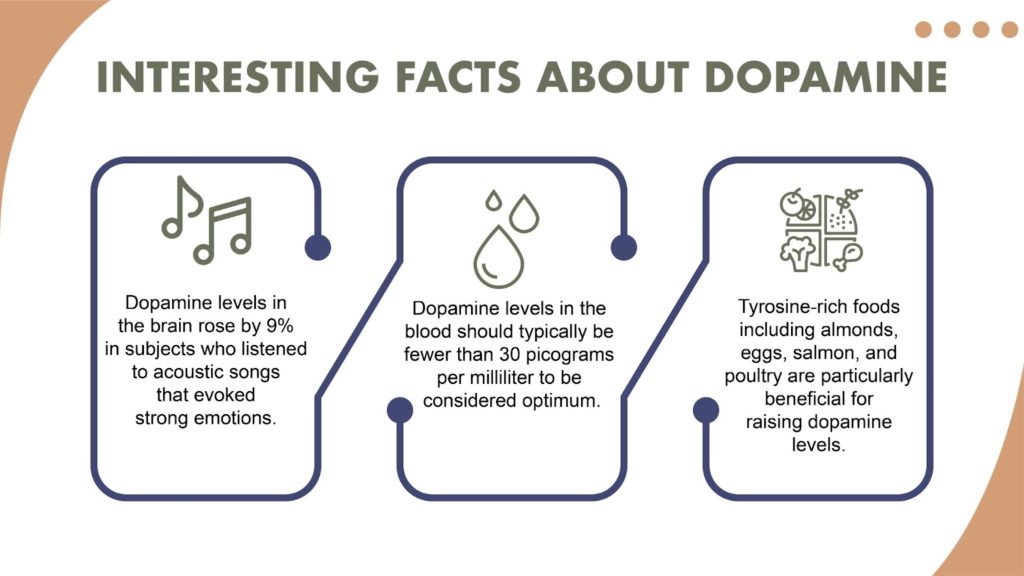One of the "feel good" compounds in our brains is dopamine. Dopamine, along with other neurotransmitters like serotonin, oxytocin, and endorphins, plays a crucial part in how joyful we feel by interacting with the reward and pleasure centre of our brain. Dopamine levels in the blood should typically be fewer than 30 picograms per millilitre to be considered optimum. Low levels of dopamine can have negative effects on our physical and mental health, while healthy levels encourage us to seek out and repeat pleasurable activities.

We feel good when dopamine levels in the brain are normal and our desire to work hard rises. We also get a strong sense of purpose and become enthusiastic about life. Dopamine levels that are in the normal range can also make us more outgoing and sociable. This "feel good" neurotransmitter also aids in enhancing our capacity for empathy, which increases our willingness to accommodate to others' needs. Dopamine can promote creativity as well with yoga courses for beginners online. All of these characteristics contribute to dopamine-induced pleasure. However, when the brain isn't receiving enough dopamine, our motivation declines, our emotions alter, and sometimes even our behaviour changes dramatically.
How to Boost Dopamine Naturally With Yoga Courses For Beginners Online?
One of the simplest ways to raise dopamine levels naturally is to adopt healthy living habits.
- Dopamine levels can be raised through activities like exercise, therapy, yoga, gardening, writing, or even playing with a pet.
- Getting regular, high-quality sleep can also support the stability of our dopamine levels.
- Dopamine levels can also be raised naturally by listening to music. The amount of dopamine in the brains of people who listened to sad acoustic songs went up by 9%.
- Keeping a balanced diet. Tyrosine-rich foods, including almonds, eggs, salmon, and, poultry are particularly beneficial for raising dopamine levels.
- Low sunlight exposure has been linked to decreased amounts of mood-enhancing neurotransmitters like dopamine. Similar to this, more sun exposure can assist in increasing dopamine levels.
- Naturally, addictive substances have a significant impact on our dopamine levels. If you are addicted, it will take some time for your brain to "reset" and start making dopamine on its own.
How do Dopamine Factors Influence Our Behavior?
Dopamine is one of the main neurotransmitters that affect how people behave. Our bodies release dopamine when we engage in pleasurable activities like indulging in gratifying cuisine, engaging in sexual activity, or using drugs. The brain subsequently establishes a reward system by linking dopamine release to pleasure. For instance, your brain releases dopamine when you consume cozy food, making you feel happy. Your brain urges you to repeat this activity because it assumes that it is a reward, even though comfort food might not be the best option for your body.
If dopamine levels remain low, we could shiver and quiver. In other situations, we could have problems like back pain that doesn't go away, constipation, weight changes, etc. Extremely low amounts of dopamine can even make it difficult for us to enjoy activities we once found pleasurable. The best part is that there are several methods by which we may naturally increase our dopamine levels.
Dopamine and reinforcement go together. It is assumed to be the chemical responsible for a person's repeated motivation. We develop our own habits with the aid of reinforcement and rewards. Positive experiences are more appealing to people, whereas negative ones are not. Our motivation to establish these patterns is dopamine. Because of this, those who have low dopamine levels may be more prone to becoming addicted to substances, foods, sex, or alcohol.
The Connection Between Dopamine and Drug Abuse
All addictive drugs affect the dopamine system in the reward pathway, which is part of the reward pathway. Researchers at universities say that this kind of overstimulation can "reduce the brain's responsiveness to natural rewards" and make it so that a person can only feel pleasure when they use the drug they abuse.
Dopamine is the neurotransmitter that motivates people to seek out pleasurable experiences and avoid unpleasant ones. One example of how using illegal substances might impair cognitive function is going from a low dopamine level to a high dopamine one. Despite the dangers of drug usage, the brain just sees it as a source of pleasure and does not try to change the behavior. Even though using drugs is a bad idea for their general health, the person's mind now perceives it as enjoyable.
This holds true not only for drug use but also for circumstances like trauma bonding, in which a person continues to be in a relationship despite its potential for harm or abuse. Even though the connection with this individual may actually be harmful, the brain does not see it as such. Online yoga courses for beginners, this is a clear example of how powerful brain chemicals can be.
Does Our DNA Predispose Us to a Higher Risk of Addiction?
Whether the addiction is a disease or a choice, and whether low dopamine levels may be a contributing factor, are hot topics in today's medical world. Some addiction medicine experts say that some people are more likely to become addicted by nature than others. They say that a person's DNA shows how likely they are to become addicted. Each person reacts differently to chemicals. For instance, some people get drunk relatively quickly, while others can consume more alcohol before becoming intoxicated. Variations in a person's genetic composition may have an impact on differences like these.
The "genetic predisposition to addiction" theory's main defense centers on genetic variations connected to these kinds of responses. This idea says that there may be a genetic factor that makes it more likely for drug abuse to run in families. Scientists say that up to 50% of our tendency to become addicted may be caused by our genes. It's a connection between genes and the environment. If you live in a safe place, it doesn't matter if your genes make you more likely to have a drug use disorder. "However, there may be epigenetic alterations that cause you to have an increased stress response to future stress and be more susceptible to the development of alcohol dependence if you have the gene for alcohol consumption and you encounter some kind of early life trauma." In other words, our genes determine how we react to adversity, which can influence whether we abuse addictive substances or not. We can stop this from happening by learning healthy ways to deal with stress, getting over past traumas, and spending time in safe, healthy places.
How Can Our Courses Help You With Balancing Dopamine Levels?
Dopamine is a neurotransmitter that is only produced when you engage in rewarding behavior, take medications, or consume alcohol. Yoga courses for beginners online increased dopamine levels, which is known to play a role in the repetition of rewarding activities. Previously, scientists thought that dopamine was responsible for experiencing pleasure. Despite the issues that drugs and alcohol can create, dopamine may play a role in why some people develop addictions to them.
